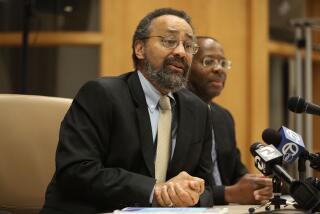Obituaries - Feb. 22, 1999
- Share via
Stefan Riesenfeld; UC Berkeley Law Professor
Stefan Riesenfeld, 90, internationally known UC Berkeley law professor who was a government advisor on the Iran hostage crisis and the Panama Canal treaty. Born in Breslau, Germany, Riesenfeld spent three years in Italy before coming to UC Berkeley in 1935. There he earned a third law degree and learned a fourth language, English, to add to his French, German and Italian. He later taught for a few years at Harvard, where he earned a fourth law degree, and at the University of Minnesota, where he earned a bachelor’s degree in electrical engineering. Riesenfeld, who became a U.S. citizen in 1940, served in the Navy during World War II and after the war was a civilian legal advisor helping to prepare West Germany’s constitution. Throughout his teaching career, Riesenfeld remained an academic legal advisor on international diplomacy on such issues as the Panama treaty negotiations, Iran hostages and the recognition of Taiwan. When he was in his 70s, he served two terms as counselor on international law in the State Department and represented the United States in three cases before the International Court of Justice. Riesenfeld wrote or edited 32 books, 140 articles and 119 book reviews and taught through last December. On Wednesday in Berkeley of heart failure.
Paul Schmidt; Writer, Composer, Literary Translator
Paul Schmidt, 65, writer and composer who translated poets and playwrights. Schmidt, who worked in avant-garde music and theater, translated the poems of Arthur Rimbaud and the plays of Anton Chekhov and Velemir Khlebnikov. An expert in Slavic languages, Schmidt brought Khlebnikov’s play “Zangezi” to Los Angeles for a performance at the Museum of Contemporary Art in 1986. That same year, Playwrights Horizons and the Music Theater Group presented Smith’s own play, “Black Sea Follies,” in New York. In collaboration with composer Tom Waits and director Robert Wilson, Schmidt composed a libretto for the opera “Alice” for the 1995 Next Wave Festival sponsored by the Brooklyn Academy of Music. His collection of Rimbaud translations, titled “A Season in Hell” from the poet’s masterpiece, with photographs by Robert Mapplethorpe, was published in 1997. On Friday in New York of complications of AIDS.
George Shambaugh Jr.; Pioneered Surgery Techniques
Dr. George Shambaugh Jr., 95, an expert on the ear and an early advocate in the use of the operating microscope to prevent deafness in people with congenital defects in the inner ear. Shambaugh’s father was himself a prominent ear, nose and throat specialist and the founder of the American Board of Otolaryngology. A native of Chicago, the younger Shambaugh attended Amherst College and Harvard Medical School and after residency became a professor of otolaryngology--the study of ear, nose and throat disorders--at Northwestern University. During his residency at Massachusetts Eye and Ear Hospital in Boston he improved methods of detecting otosclerosis, which if not found can cause noise in the ear and deafness later in life. In the 1950s, he introduced the operating microscope to delicate ear surgery. In his later career, he stopped doing surgical work and devoted much of his time to environmental and holistic medicine. He felt that he could help many of his patients through diversified diets and mineral supplements. Shambaugh never retired and was still seeing patients just two weeks before his death on Feb. 7 at his home in Sanwich, Ill.
More to Read
The biggest entertainment stories
Get our big stories about Hollywood, film, television, music, arts, culture and more right in your inbox as soon as they publish.
You may occasionally receive promotional content from the Los Angeles Times.










